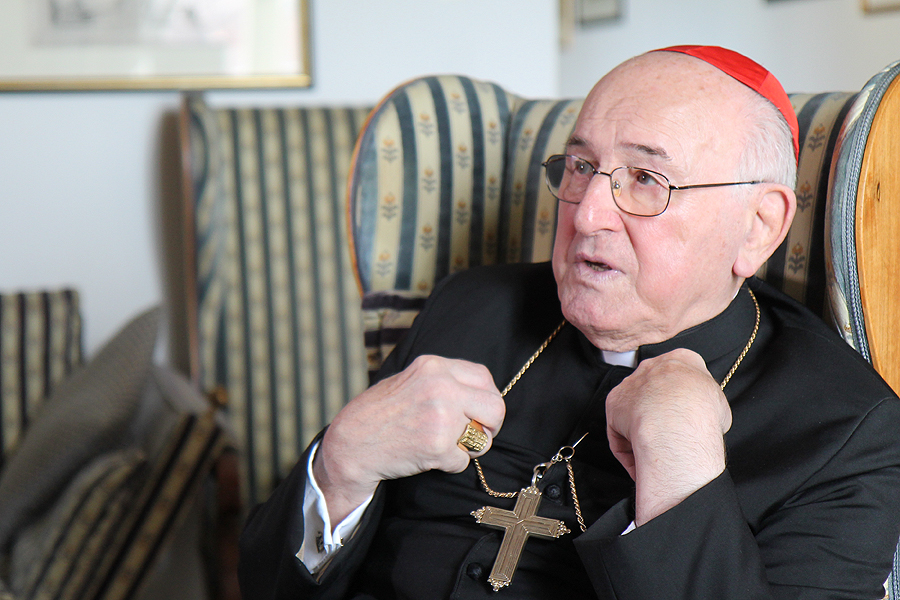One of the two remaining dubia cardinals, Cardinal Walter Brandmüller, has just given an interview to the prominent German newspaper Frankfurter Allgemeine Zeitung (FAZ) which has been published today, 28 October. In this lengthy interview, the 88-year old German prelate explains once more the fundamental teaching of the Catholic Church on marriage, as it has been laid out by Jesus Christ Himself, in its sacramental and indissoluble character. Cardinal Brandmüller – who is known for his courageous outspokenness – made some remarks that might be of special interest to our readers. That is to say, he made it clear that one may not change that teaching on marriage:
That is to say, he who claims that one may enter a new relationship while one’s own lawful wife is still alive is excommunicated because this is an erroneous teaching, a heresy. Whoever does make such a claim [is excommunicated]. And he who simply practices it [adultery] is gravely sinning. And then there is added that whoever is conscious of a grave sin may only go to Communion if he previously has done penance, has confessed his sins, and has been absolved. Thus, if someone thinks he can contradict the defined Dogma of a General Council [Council of Trent], then that is indeed quite vehement. Exactly that is what one calls heresy – and that means exclusion from the Church – because one has left the common foundation of Faith. [emphasis added]
When asked about a German progressive theologian – Magnus Striet – who recently claimed that the papal document Amoris Laetitia does indeed change the Church’s teaching, and not, as some claim, merely deepen it, Cardinal Brandmüller confirms this opinion and line of argument, saying:
He is of course right. There are indeed still people who can think. I have the great concern that something is going to explode. People are not stupid. Alone the fact that a request for clarification addressed to the pope, with 870,000 signatures, [and also] that 50 scholars with international reputation have remained without answer, does raise indeed some questions. That is really hard to understand.
The journalists of the Frankfurter Allgemeine Zeitung also raise the issue of the changed and somewhat fearful atmosphere in Rome under the Francis papacy (as it has been recently discussed by Cardinal Gerhard Müller himself), to include the tense atmosphere during the “rigged” family synods. Cardinal Brandmüller himself also indirectly confirms such matters by saying: “Yes, such criticism is being increasingly expressed – even in Ross Douthat’s articles in the New York Times.” And the German prelate continues, saying:
There are journalists who say that the atmosphere has totally changed in the Vatican. One speaks only any more with his closest friends. If one speaks over the phone, one prefers to use the cell phone. What shall I say about that?
The German cardinal is also once more being asked to explain the major concerns of the dubia as put forth to the pope by him and the other three dubia cardinals. He explains that to pose such dubia in the case of a lack of clarity is a normal process within the Catholic Church. Cardinal Brandmüller then adds some specific words about the current dubia concerning Amoris Laetitia:
To put it simply, it is here about the question: Can today something be good which has been a sin yesterday? Additionally, the question is being presented as to whether there are truly – as the continuous teaching says – acts that are always and under all circumstances morally reprehensible? Such as in the case of the killing of an innocent person – or also adultery, for example? That is where it leads to. Should the first question now indeed be answered with “yes” and the second question with a “no”, then this would be a heresy and consequently a schism. The split of the Church. [emphasis added]
When asked whether a schism really is now thinkable or likely, the German cardinal replies: “May God forbid it.”
These piercing statements of Cardinal Brandmüller are coming to us in the wake of another German interview, in which the Protestant theologian and general secretary of the World Evangelical Alliance – Professor Thomas Schirrmacher – who is a friend of Pope Francis announced that the group of Catholics who resist the papal reforms “is not a minority.” As Schirrmacher said to the German newspaper Die Zeit‘s subsection Christ&Welt on 26 October about Pope Francis:
He has made himself immense enemies in the Vatican and he is taking a great risk. Loud voices in his Church are already denying that he is still pope. […] Today, there is open talk about what kind of means of resistance against the pope exist. For a Protestant, this does not sound very Catholic any more. The Vatican still pretends as if this is only a small minority which seeks this confrontation. But this [resistance] is not any more a minority. [emphasis added]


